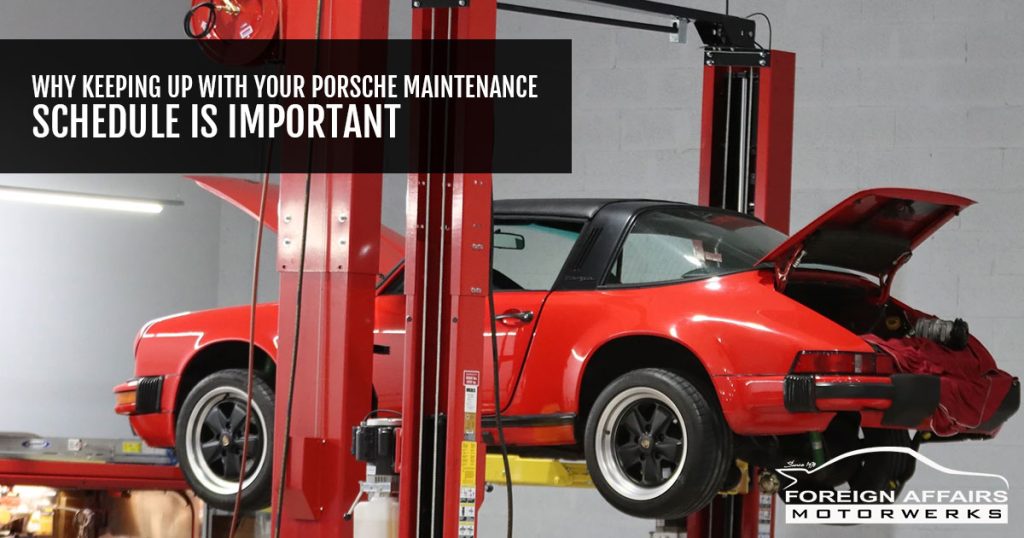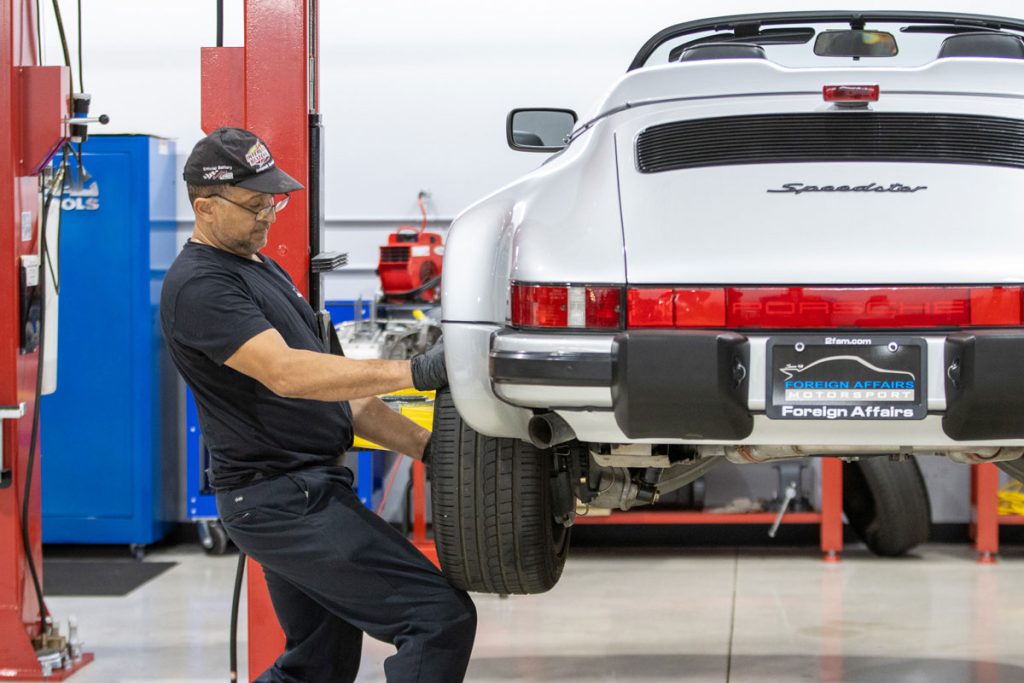Why Keeping Up With Your Porsche Maintenance Schedule Is Important

- Reliability
- Battery and Electronics
- Tire Health
- Brake and Suspension Safety
- Engine Performance
- Carbon Buildup
- Porsche Recommended Service Schedule
- Model Specific Maintenance
- 996 991 & 986 Boxster IMS Bearing
- 9PA Cayenne Fuel Pump Failures
- Porsche Specialist In Pompano Beach
There are two main reasons you’ll want to follow Porsche’s factory-recommended maintenance schedule. The first reason is to protect the resale value of your Porsche. The second reason is to ensure you can enjoy your Porsche by making sure it continues to behave like a Porsche. Not sure what we mean by that? Well, let us dive a little deeper into the importance of the Porsche maintenance schedule.
Reliability
Sunday morning. The sun is out, the roads are quiet, and it’s the perfect time to take your Porsche out for a spin, except you’ve neglected your maintenance, and your pride and joy just won’t start. By keeping up with your maintenance, you can ensure your Porsche is reliable and always delivers the performance you expect. Regular maintenance ensures common repairs are done and that the following systems are always ready to go.
Battery and Electronics
Modern Porsches are chock filled with computers and other electronics, and a bad battery can quickly put an end to your fun. Even a vintage Porsche needs a healthy battery to get going. During a service, the technician will test the health of your battery and recommend a replacement if needed.
They may also recommend and install a battery tender charger to ensure your rarely used Porsche is always ready to go.

Tire Health
Some Porsches have very aggressive cambers in order to give you the maximum amount of grip around corners. Unfortunately, the camber does result in the inside of the wheel wearing faster than the outside, which is often hard to see with how low Porsches can be.
During a service, technicians will check the tread depth of your tires on the outside, middle, and inner to ensure your Porsche has enough rubber to put the power to the ground and to ensure your safety while operating.
Brake and Suspension Safety
On the note of safety, we cannot forget about brakes and suspension. Arguably two of the most important systems in preventing accidents and keeping you safe. Making sure your brakes and suspension are in spec is vital to your Porsche handling predictably and stopping when you need it to stop. Keeping up with a regular Porsche maintenance schedule ensures the brake and suspension systems are working properly.

Engine Performance
Finally. One of the reasons you chose a Porsche. The : the performance. Regular engine maintenance will make sure that all of your horses are strong and healthy, ready to go at a moment’s notice. Oil changes, filter replacement, and new consumable items all play vital roles in maintaining a high-performance output.
Carbon Buildup
All generations of the Panamera, the 911 from the 997 generation onwards, and all other models from 2016 onwards suffer from carbon buildup. This is a regular issue found in all direct injection engines and isn’t subject to Porsches alone. Carbon build-up can cause interference with valves and not allow them to seat seal and close properly, leading to lower compression and a drop in performance. W
Carbon cleanup is a relatively straightforward but incredibly in-depth task. It requires mechanics to remove intake manifolds and raise the piston to the topmost position. They then use a mild abrasive material such as walnut shells to pressure blast the carbon off the surfaces of the engine. The loose carbon and excess shells are then vacuumed out of the cylinder before the task is repeated on the next cylinder.
Porsche Recommended Service Schedule
Porsche recommends you service your vehicle every 10,000 miles or once a year, whichever comes first. Drivers who frequent track days and other performance events may one want to lower that interval to every 6500 miles, depending on how hard your push your Porsche.
Every 10,000 miles, your Porsche will undergo regular service, which includes changing the oil, oil filter, and air filter, along with a multipoint inspection. Every 20,000 miles calls for an Intermediate service which includes all the tasks of regular service as well as replacing the cabin filter.
Every 40,000 miles, your Porsche will undergo a 10,000 and 20,000-mile service, as well as a major service. A major service replaces serpentine belts, brake and clutch fluids, fuel filters, and spark plugs while flushing and refilling the coolant system.

Model Specific Maintenance
While the previously listed items are good maintenance advice for all models of Porsches, some very important maintenance items are only specific to some models.
996 991 & 986 Boxster IMS Bearing
The engine used in the 996 generation 911 and 986 Boxster’s engine has a fatal design flaw. The intermediate shaft (IMS) bearing is a grease-filled sealed bearing that supports the intermediate shaft, which drives the camshafts on the flywheel side of the engine. Unfortunately, with use and heat cycles, the grease in the bearing wears out and hardens, which leads to the bearing being under-lubricated.
When the bearing fails, it throws out timing, and since the 911 engine is an interference engine, the pistons can make contact with the valves causing catastrophic damage.
Porsche revised the IMS bearing and added a replacement to the maintenance cycle every 50,000 miles, but there have been reports of IMS bearings failing earlier than that, with no warning signs. There are aftermarket solutions that greatly extend the IMS bearing’s lifespan.
9PA Cayenne Fuel Pump Failures
The first-generation Porsche Cayenne featured two low-pressure fuel pumps in the fuel tank. The fuel tank is a saddle style which means there are two tanks on either side of the driveshaft with a section of tank connecting them on the top. The primary fuel pump is responsible for pumping fuel to the engine, while the secondary pump’s fuel from its tank to the tank the primary pump is in.
Unfortunately, these pumps are prone to overheating when not submerged in fuel, which occurs any time the fuel tank is less than half full. A failure in the primary pump will starve the engine, while a failure in the secondary pump staves the primary pump. It’s difficult to diagnose a failed pump as often only one fails, as doing the ignition test to listen if a pump is priming often gives a false positive.
Porsche Specialist In Pompano Beach
Foreign Affairs Motorsport is the go-to Porsche service center in Southern Florida. We built our name by servicing, repairing, and modifying Porsches. We’ve gone on to build some of the wildest and most unique Porsches Florida has ever seen, such as The Outlaw 911. So if you own a Porsche, make sure you bring it to the Porsche maintenance schedule experts at Foreign Affairs Motorsports.



